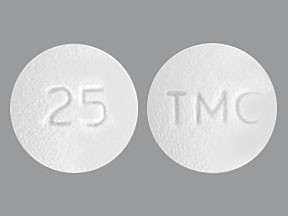RILPIVIRINE - ORAL
PHONETIC PRONUNCIATION: (RIL-pi-VIR-een)
COMMON BRAND NAME(S): Edurant
GENERIC NAME(S): rilpivirine HCl
Uses
USES: Rilpivirine is used with other HIV medications to help control HIV infection. It helps to decrease the amount of HIV in your body so your immune system can work better. This lowers your chance of getting HIV complications (such as new infections, cancer) and improves your quality of life. This medication is usually prescribed to people who have not taken any HIV medications before. Rilpivirine is a non-nucleoside reverse transcriptase inhibitor (NNRTI). It blocks the virus from growing and infecting more cells. Rilpivirine is not a cure for HIV infection. To decrease your risk of spreading HIV disease to others, do all of the following: (1) continue to take all HIV medications exactly as prescribed by your doctor, (2) always use an effective barrier method (latex or polyurethane condoms/dental dams) during all sexual activity, and (3) do not share personal items (such as needles/syringes, toothbrushes, and razors) that may have contacted blood or other body fluids. Consult your doctor or pharmacist for more details.
How to use RILPIVIRINE - ORAL
HOW TO USE: Read the Patient Information Leaflet if available from your pharmacist before you start using rilpivirine and each time you get a refill. If you have any questions, ask your doctor or pharmacist. Take this medication by mouth with a meal as directed by your doctor, usually once daily. The dosage may be based on other medications you are taking. Be sure to tell your doctor and pharmacist about all the products you use (including prescription drugs, nonprescription drugs, and herbal products). Medications which reduce or block stomach acid (such as proton pump inhibitors/PPIs, H2 blockers, antacids) may reduce the absorption of rilpivirine, making it work less well. Do not take PPIs (such as omeprazole, lansoprazole) while using this medication. If you take antacids, take the antacids at least 2 hours before or at least 4 hours after rilpivirine. If you take H2 blockers (such as famotidine, ranitidine), take them at least 12 hours before or at least 4 hours after rilpivirine. It is very important to continue taking this medication (and other HIV medications) exactly as prescribed by your doctor. Do not take less of this drug than prescribed or stop taking it (or other HIV medicines) even for a short time unless directed to do so by your doctor. Doing so may cause the amount of virus to increase and/or make the infection more difficult to treat (resistant). Do not increase your dose or take this medication more often than prescribed. Your condition will not improve any faster, and the risk of serious side effects may increase. For the best effect, take this medication at evenly spaced times. To help you remember, take this medication at the same time every day.
Side Effects
Precautions
Interactions
Overdose
Images
Reviews
Faq for RILPIVIRINE - ORAL
Rilpivirine is used in combination with other antiretroviral drugs to treat HIV infection. It helps to reduce viral load and improve immune function.
You should take Rilpivirine exactly as prescribed by your healthcare provider. It is typically taken orally once daily with a meal. It is important to follow the instructions provided with the medication.
Common side effects of Rilpivirine may include headache, dizziness, trouble sleeping, depression, rash, and stomach upset. It is important to inform your healthcare provider if you experience any side effects.
Rilpivirine can interact with certain medications, including antacids, proton pump inhibitors, rifampin, and anticonvulsants. It is important to inform your healthcare provider about all the medications you are taking to avoid potential interactions.
Rilpivirine is generally not recommended for use during pregnancy, as it may harm the unborn baby. It is also not known if the drug passes into breast milk, so it is advisable to discuss the risks and benefits with your healthcare provider if you are breastfeeding.
If you miss a dose of Rilpivirine, take it as soon as you remember. However, if it is close to the time for your next dose, skip the missed dose and resume your regular dosing schedule. Do not double the dose to make up for the missed one.
Rilpivirine is not a cure for HIV infection. It is used to manage the infection and control viral replication. It is important to continue taking the medication as prescribed by your healthcare provider and to follow all recommended lifestyle and prevention measures.
Rilpivirine may cause severe skin reactions, liver problems, and mood changes. It is important to inform your healthcare provider about any medical conditions or allergies you have before starting the medication. Regular monitoring of liver function and mental health may be required during treatment.
Drinking alcohol in moderation is generally considered acceptable while taking Rilpivirine. However, excessive alcohol consumption can increase the risk of liver problems and may decrease the effectiveness of the medication. It is advisable to consult with your healthcare provider regarding alcohol consumption.
Disclaimer
IMPORTANT: HOW TO USE THIS INFORMATION: This is a summary and does NOT have all possible information about this product. This information does not assure that this product is safe, effective, or appropriate for you. This information is not individual medical advice and does not substitute for the advice of your health care professional. Always ask your health care professional for complete information about this product and your specific health needs.

No Reviews Yet